
Research and Practice in Thrombosis and Haemostasis
Scope & Guideline
Fostering collaboration for breakthroughs in hematology.
Introduction
Aims and Scopes
- Thrombosis and Hemostasis Disorders:
The journal emphasizes research on various thrombotic and bleeding disorders, including venous thromboembolism, hemophilia, and acquired bleeding disorders. This includes the exploration of their underlying mechanisms, risk factors, and clinical outcomes. - Innovative Therapeutics and Management Strategies:
A significant focus is placed on the development and evaluation of new therapeutic interventions, including direct oral anticoagulants, novel factor therapies, and patient-centered management strategies in thrombosis and bleeding disorders. - Clinical Guidelines and Practice Patterns:
The journal addresses the implementation of clinical guidelines and practice patterns in managing thrombosis and hemostasis, with a keen interest in how these guidelines affect patient outcomes and healthcare practices. - Translational Research and Technology Integration:
Research articles often explore the integration of advanced technologies, such as machine learning and patient-reported outcomes, into clinical practice to enhance diagnosis, treatment, and understanding of thrombosis and hemostasis disorders. - Population Health and Epidemiology:
The journal investigates the epidemiology of thrombotic events and bleeding disorders, particularly in diverse populations, and how social determinants of health influence outcomes in these conditions.
Trending and Emerging
- Patient-Centered Outcomes and Quality of Life:
There is an increasing emphasis on research that evaluates patient-reported outcomes and quality of life in individuals with thrombosis and bleeding disorders, focusing on how treatments impact daily living and overall well-being. - Use of Machine Learning and AI in Thrombosis Research:
Emerging studies are leveraging machine learning and artificial intelligence to predict thrombotic events, optimize treatment protocols, and personalize patient care, indicating a significant shift towards data-driven approaches. - Thrombo-inflammation and COVID-19:
Research exploring the intersection of thrombo-inflammation and COVID-19 has surged, focusing on how the pandemic has altered the landscape of thrombosis and hemostasis management. - Diversity and Health Disparities:
There is a growing focus on understanding health disparities in thrombosis and bleeding disorders, particularly how race, ethnicity, and socioeconomic status influence outcomes and treatment access. - Innovative Antithrombotic Therapies:
Research on novel antithrombotic therapies, including bispecific antibodies and gene therapies, is on the rise, reflecting advancements in treatment strategies for managing complex coagulation disorders.
Declining or Waning
- Traditional Anticoagulation Therapies:
Research on older anticoagulation therapies, such as low molecular weight heparins and vitamin K antagonists, is less frequently published as attention shifts toward newer direct oral anticoagulants and more innovative treatment options. - Basic Laboratory Techniques:
There is a waning interest in basic laboratory techniques and assays that have been standard for years, as the field increasingly favors novel methodologies and technologies that provide more precise and clinically relevant data. - Single-Center Studies:
The prevalence of single-center studies appears to be decreasing, with a trend toward multicenter and international studies that offer broader insights and higher generalizability. - Case Reports and Small Case Series:
The journal has seen a reduction in the publication of case reports and small case series, likely due to a preference for larger studies that provide more robust evidence.
Similar Journals
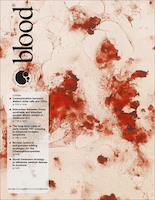
BLOOD
Advancing the Science of Hematology.BLOOD, published by the American Society of Hematology, is a premier peer-reviewed journal in the fields of Biochemistry, Cell Biology, Hematology, and Immunology. With an impressive impact factor and ranking in the top quartiles (Q1) across multiple disciplines, BLOOD is essential reading for researchers and professionals seeking to stay updated on the latest advancements in hematology and related fields. The journal has been a cornerstone of hematological research since its inception in 1946, providing a platform for rigorous scientific inquiry and discourse. Its commitment to publishing high-quality original research, comprehensive reviews, and insightful editorials makes it a vital resource for students, practitioners, and scientists alike. By offering exceptional access to influential publications, BLOOD continues to shape the future of hematology and enhance understanding of blood-related disorders, marking its vital role in advancing both basic and clinical research.
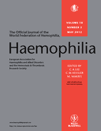
HAEMOPHILIA
Pioneering insights in hematology and genetics.HAEMOPHILIA is a leading peer-reviewed journal published by Wiley, dedicated to advancing research and clinical practices in the fields of hematology and genetics. With an impressive Impact Factor and recognition within the Q1 category for Genetics (clinical), Hematology, and Medicine (miscellaneous), this journal presents a unique platform for the dissemination of high-quality research from 1995 to the present. Researchers in these dynamic fields will find invaluable insights through original articles, systematic reviews, and clinical trials, all aimed at improving therapeutic strategies and patient outcomes. Although it operates on a subscription basis, HAEMOPHILIA's commitment to excellence is reflected in its Scopus rankings, where it stands in the 74th percentile for hematology and the 71st percentile for clinical genetics. As an essential resource for academics, healthcare professionals, and students, HAEMOPHILIA plays a pivotal role in fostering innovation and collaboration within the global medical community.

PHLEBOLOGIE
Innovative Insights into Cardiovascular HealthPHLEBOLOGIE is an esteemed journal published by GEORG THIEME VERLAG KG, serving as a critical platform for the dissemination of research in the field of Cardiology and Cardiovascular Medicine. Since its inception in 1991, the journal has consistently provided a comprehensive range of articles that explore the complexities of vascular health, offering insights into innovative treatments, diagnostic advancements, and emerging trends. Although currently not available as an Open Access publication, PHLEBOLOGIE maintains an impactful presence in the academic community, evident in its 2023 Scopus ranking as Q3 within its category and a percentile standing of 25%. Residing in Germany, PHLEBOLOGIE aims to bridge the gap between research and practice, appealing to researchers, clinicians, and students alike by fostering a deeper understanding of vascular conditions and their management.
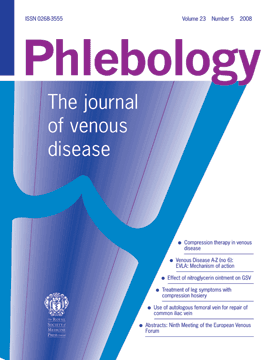
PHLEBOLOGY
Exploring the future of phlebology and cardiovascular care.PHLEBOLOGY is a renowned academic journal published by SAGE Publications Inc. that focuses on the evolving field of phlebology and related cardiovascular issues. With an ISSN of 0268-3555 and an E-ISSN of 1758-1125, this journal serves as a pivotal platform for disseminating high-quality research, clinical findings, and innovative practices in venous disease management and treatment. Operating from the United Kingdom, tasked with a mission to advance the scientific understanding and clinical practice surrounding venous disorders, PHLEBOLOGY is currently ranked in the Q3 category for both Cardiology and Cardiovascular Medicine, as well as in Medicine (miscellaneous) for 2023. Its Scopus rank of #192 out of 387 highlights its commitment to excellence, ensuring that it reaches a respectable 50th percentile within its fields. Although it does not offer open access, the journal invites contributions from researchers, healthcare professionals, and students, fostering a community dedicated to improving patient outcomes and promoting evidence-based practices in venous health.
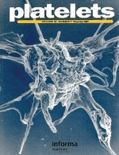
PLATELETS
Innovating hematology through groundbreaking research.PLATELETS is a distinguished journal published by Taylor & Francis Inc that has been at the forefront of research in the fields of hematology and medicine since its inception in 1990. With an ISSN of 0953-7104 and an E-ISSN of 1369-1635, this journal boasts a solid reputation, as reflected by its Q2 ranking in both Hematology and Miscellaneous Medicine categories in 2023. PLATELETS serves as an essential platform for disseminating pioneering research, reviews, and case studies related to platelet biology, thrombosis, hemostasis, and their clinical implications. Although not an open-access publication, it is indexed in reputable databases, ensuring visibility and citation of quality contributions. Researchers, clinicians, and students alike will find valuable insights that may inform their work and enhance their understanding of the crucial role of platelets in health and disease. This journal's commitment to advancing knowledge and fostering innovation makes it a pivotal resource in the academic community.

Annals of Vascular Diseases
Advancing Vascular Research for a Healthier TomorrowAnnals of Vascular Diseases is a leading international journal dedicated to the comprehensive exploration of vascular pathology, aimed at advancing knowledge in the field through innovative research and insightful reviews. Published by the ANNALS VASCULAR DISEASES EDITORIAL OFFICE and available in both print (ISSN: 1881-641X) and electronic format (E-ISSN: 1881-6428), this journal has embraced Open Access since 2017, facilitating wider dissemination and accessibility of vital research findings. With its focus on clinical and experimental studies relating to vascular diseases, the journal serves as a crucial platform for researchers, medical professionals, and students who seek to stay at the forefront of clinical advancements. By fostering collaboration and sharing knowledge, Annals of Vascular Diseases plays a significant role in shaping the future of vascular research and treatment strategies worldwide.

Journal of Hematology
Connecting Scholars, Enhancing PracticeThe Journal of Hematology, published by ELMER PRESS INC, serves as a pivotal platform for disseminating cutting-edge research in the field of hematology. With an ISSN of 1927-1212 and an E-ISSN of 1927-1220, this journal is committed to advancing scientific knowledge and clinical practice through high-quality peer-reviewed articles encompassing all aspects of blood disorders, from basic science to health policy implications. While the journal currently operates under a traditional access model, it nonetheless prioritizes the rapid publication of significant findings, ensuring that researchers, clinicians, and students have timely access to the latest advancements in hematological research. Positioned to bridge gaps in knowledge and foster collaboration among scholars worldwide, the Journal of Hematology is an essential resource for anyone invested in this vital area of medicine.

ANNALS OF HEMATOLOGY
Advancing hematological science through rigorous research.ANNALS OF HEMATOLOGY, published by Springer in Germany, stands as a premier platform for advancing knowledge in the field of hematology and medicine at large. With a significant impact factor and recognized rankings—Q2 in Hematology and Q1 in Medicine (miscellaneous) as of 2023—this journal is pivotal for researchers, clinicians, and students who are keen on exploring the latest developments in blood disorders, treatments, and innovative methodologies. Its broad scope encompasses original research, reviews, and discussions that aim to foster interdisciplinary dialogue, ensuring that the latest findings and theories are accessible to the scientific community. Although not an open-access journal, its rigorous peer-review process guarantees high-quality contributions, thereby solidifying its reputation as a vital resource in the hematological field. Founded in 1991, the ANNALS OF HEMATOLOGY continues to evolve, converging invaluable insights from both basic and clinical research until 2024. For those dedicated to improving patient outcomes and advancing hematological science, this journal remains an essential reference.
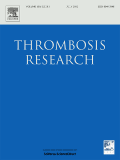
THROMBOSIS RESEARCH
Pioneering Insights in Hematology ResearchTHROMBOSIS RESEARCH is a leading peer-reviewed journal in the field of hematology, published by PERGAMON-ELSEVIER SCIENCE LTD. With an impressive impact factor and ranked within the top 10 of 137 in its category according to Scopus, this journal provides a critical platform for the dissemination of innovative research related to thrombosis and hemostasis. Established in 1972, THROMBOSIS RESEARCH has been at the forefront of scholarly communication, addressing key issues, findings, and advancements over more than five decades. Recognized for its high-quality content, the journal is categorized in the Q1 quartile for 2023, reflecting its influence and relevance within the scientific community. Researchers, medical professionals, and students engaged in the study of blood disorders will find valuable insights and the latest discoveries within its pages. Although currently not an open-access publication, THROMBOSIS RESEARCH remains accessible to a wide audience through institutional subscriptions, ensuring that vital research continues to inform and enhance clinical practices around the globe.

Journal of Blood Medicine
Connecting Minds: Bridging Research and Clinical Practice in HematologyThe Journal of Blood Medicine, published by DOVE MEDICAL PRESS LTD, stands as a vital resource in the field of hematology, focusing on the latest research developments and clinical advancements in blood medicine. With an impact factor reflective of its growing relevance, this open-access journal has been delivering quality scholarly work since 2010, ensuring that critical research is readily available to the global scientific community. The journal operates under an open-access model, further enhancing its dissemination and accessibility to researchers, professionals, and students alike. In the 2023 rankings, it secured a Q3 category status within hematology and achieved a commendable 76th rank out of 137 in Scopus listings, indicating its commitment to quality and innovation in this specialized area. Located in New Zealand, the journal's diverse topics encompass clinical research, treatment modalities, and emerging therapies, contributing significant insights vital for shaping future advancements in blood medicine.